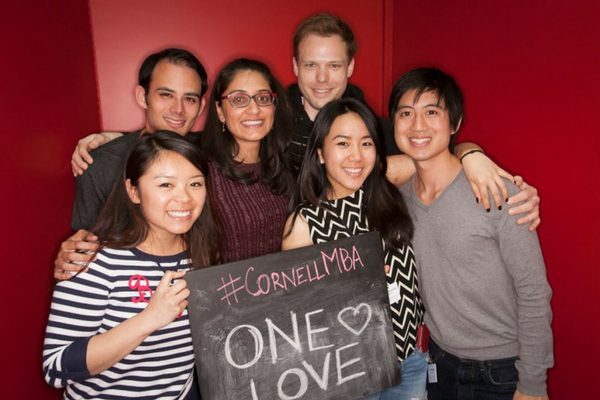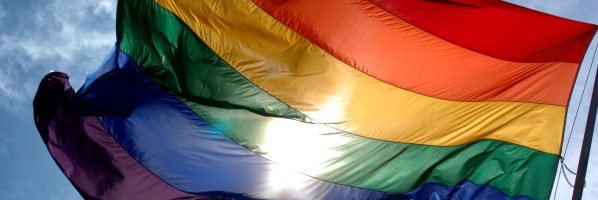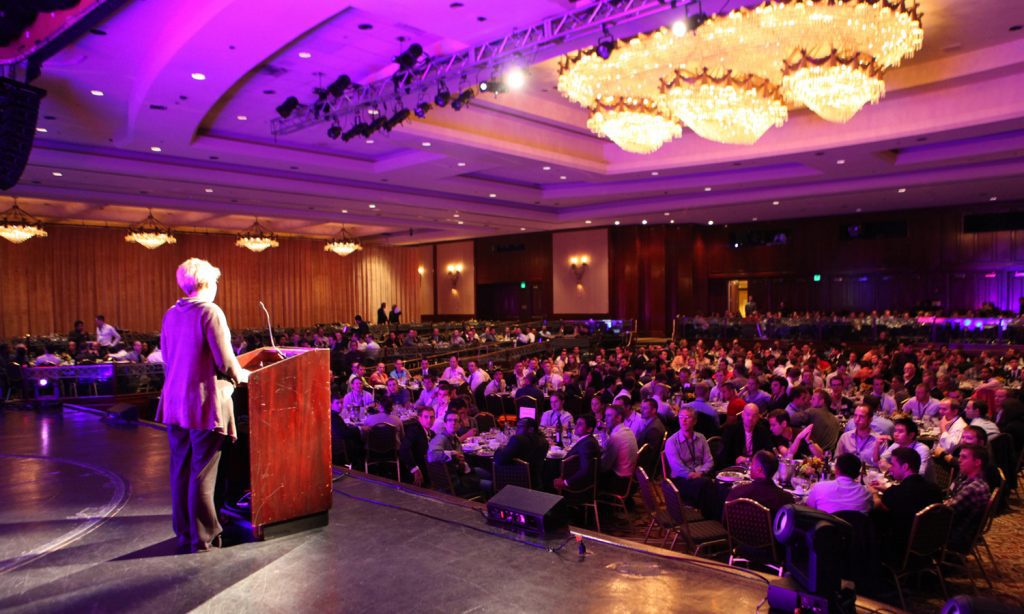Ivey Expands MBA LGBTQ Resources, and More – Toronto News

Toronto business schools have been making waves worldwide in recent weeks. Let’s take a look at some of the week’s highlights.
An Alternative to Word-of-Mouth Advertising for Small Businesses – The Globe and Mail
Jared Lenover, digital marketing strategist at McMaster University’s Degroote School of Business, was featured in The Globe and Mail, weighing in on the effectiveness of geo-targeting to promote a local business. Geo-targeting is a form of advertising being offered by little-known platforms like Facebook, wherein a business can use location targeting and demographic data to reach specific social media users who might be interested in or have easier access to the product in question. Julie and Sheldon Harrish, a Toronto couple and owners of the 6ix Cycle spin studio in Toronto, tried geo-targeting and found it to be more effective than word-of-mouth alone. In fact, the small business saw a two percent growth in usage.
According to Lenover, geo-targeting “helps you make your audience more relevant.” Lenover emphasized the benefits of the advertising strategy, asserting that it “does allow the advertiser to be more efficient with their budget.”
Read more about 6ix Cycle and geo-targeting here.
Ivey’s MBA LGBTQ Student Club Connects With Global Organization – News@Ivey
Out & Allied @ Ivey, the LGBTQ MBA student club at Western University Canada’s Ivey School of Business, has joined forces with a global network of LGBTQ MBA students and alumni. The global network, Reaching Out MBA (ROMBA) seeks to inspire LGBTQ MBAs to be leaders in their communities. This connection will give Ivey MBA LGBTQ students the opportunity to participate in networking events, such as the annual ROMBA Conference, wherein they can mingle with industry leaders from around the globe.
“We want applicants considering Ivey’s MBA program to see the environment as safe, supportive, and open. ROMBA is a great organization to give our students access to an important and diverse network.” – Jay Kiew, outgoing President of the Ivey MBA Association (MBAA)
Read more about Ivey’s affiliation with ROMBA here.
DECA Ryerson’s TRSM Students Win Big at ICDC Competition in Washington DC – TRSM News
Ryerson University’s Ted Rogers School of Management (TRSM) is currently celebrating last month’s victory at the (International Career Development) ICDC Competition. The DECA TRSM team traveled to Washington DC from April 10-15 in order to showcase their knowledge and work. DECA is an international network with over 200,000 members, whose aim is to prepare aspiring leaders in high school and college in finance, management, hospitality, and marketing.
The students who went to DC had to place in the top three for their category (Fashion Merchandising and Marketing, Travel and Tourism, Restaurant and Food Service Management, Human Resource Management, and International Marketing) at DECA U Ontario’s Provincials. The students selected competed against upwards of 1,500 students from around the world, and went home with 24 medals and six plaques.
You can read more about DECA Ryerson’s big win here.
How Toronto Schools Can Help You Pay for Your MBA

Earning your MBA can be an expensive prospect. In Canada, tuition at the most expensive MBA programs can cost more than $100,000 for full-time and part-time students. This can be difficult for some low-income applicants.
So, what are some Toronto schools doing to help offset the cost of tuition, living, and other expenses to pay for your MBA? Continue reading…
Cornell Johnson LGBT Community Helping Students Succeed

Cornell’s Johnson School of Management recently highlighted several of its LGBT student organizations and fellowships that actively challenge attitudes in the workplace and help LGBT MBAs feel more supported.
The article cites a 2013 Deloitte and Kenji Yoshino study entitled Uncovering Talent, which finds that 83 percent of LGBT employees covered their identities at work, a practice that “decreases employees’ loyalty and commitment to their organization.” Compare this figure to “79 percent of blacks, 66 percent of women, 63 percent of Hispanics, and 45 percent of white heterosexual men.”
“LGBT employees may feel conflicted if they have to lead double lives in fear of being passed over for a job promotion or fired for being who they are. Today, employers in 28 states can terminate workers for self-identifying as LGBT,” explained Reaching Out MBA (ROMBA) Fellow Brian Tsui, MBA ’18.
“People on the outside wonder about your status, and the LGBT person, whether out or not, can be constantly managing their image and behaviors,” adds Ryan Armstrong, MBA ’17.

Photo via Cornell Johnson
In addition to the Out for Business student group, Johnson offers two fellowships in conjunction with ROMBA, a 20-year-old organization that helps students “find sincerely welcoming communities.”
“ROMBA was originally meant to build a stronger network of LGBT peers who would go into well-paid, high-powered jobs, and be able to look after each other as a network,” says ROMBA executive director Matt Kidd.
ROMBA promotes LGBT business school leadership and “provides information about the LGBT status of business schools worldwide, application and job prep and guidance, and conferences and treks to help students find environments that are right for them.”
”I’ve had many doors open because I had an introduction from someone within the LGBT community,” said ROMBA Fellow Sara Johnson, MBA ’18.
Tsui adds, “I found the courage to be proud and vocal after finding support at the annual ROMBA conference. LGBT alumni from MBA programs proved to me that I could be successful in my career and authentic at the same time.”
You can read more about the student organizations at Cornell’s SC Johnson Graduate School of Management here.
To Be Out—or Not to Be Out—in Your MBA Application?

In honor of yesterday’s National Coming Out Day, we thought we’d tackle a thorny question faced by some applicants to leading business schools: To be out—or not to be out—in your MBA application? In recent years, increasing numbers of top business schools have given applicants the opportunity to disclose their sexual orientation as lesbian, gay, bisexual, transgender, or queer (LGBTQ) as part of their application if they so choose. But what are the pros and cons of doing so? To find out, we spoke with admissions directors at schools all over the country to get their input.
The overwhelming consensus, we found, was that there are multiple positives and few, if any, negatives to sharing your sexual orientation as part of the application process provided you feel comfortable doing so. This is not to say that anyone should feel pressured to disclose anything that they are not personally comfortable sharing—just that those who feel inclined to share shouldn’t have any hesitation from an admissions standpoint.
“I Really Only See Pros”
“I really only see pros,” says Soojin Kwon, managing director of full-time MBA admissions at the University of Michigan’s Ross School of Business. “We are always encouraging applicants to be very authentic and bring their whole selves so that we have context around them. We are a very diverse and inclusive community, and we want to know every aspect of who you are and what you’ll bring to that community.”
Applicants who do disclose LGBTQ status—or even those who don’t—also can indicate that they would be interested in hearing from students in the school’s Out for Business student club, which helps prospective students get tapped into the campus LGBTQ community well before they arrive on campus. “Our current LGBTQ students absolutely reach out, embrace, and actively engage with applicants who self-identify because they want to make sure that our community is very strong on every aspect of diversity—they are very proactive,” Kwon says.
NYU Stern School of Business Associate Dean of MBA Admissions Isser Gallogly stresses that whether or not to disclose sexual orientation is a personal choice that should be based on each individual’s comfort level. “But certainly at NYU Stern—in New York’s Greenwich Village—we are obviously incredibly diverse and supportive of diversity,” he says. The LGBTQ rights movement can trace its origins to the neighborhood surrounding Stern, and a community of acceptance has prevailed there for decades.
“It Might Present Certain Advantages”
But even beyond Greenwich Village and Stern, Gallogly tells LGBTQ applicants that they shouldn’t have concerns about being out in the MBA admissions process. “Business schools are looking for diversity—we as admissions officers are always looking for different vantage points and perspectives that applicants can bring to the class. I think anything that’s a little different or unique only helps your personal story,” he says. “I don’t think there’s any disadvantage to being out in the admissions process, and, in fact, it might present certain advantages.”
Self-Identifying Is First Step to Qualifying for LGBTQ MBA Fellowship
Indeed, students who self-identify as LGBTQ at certain schools will automatically be considered for scholarship aid through the Reaching Out LGBTQ MBA (ROMBA) Fellowship Program. ROMBA is a nonprofit organization dedicated to “educating, inspiring, and connecting the student and alumni LGBTQ MBA and graduate communities in an ongoing effort to create the next generation of out business leaders.” Recipients of the LGBTQ MBA Fellowship each receive a minimum of $10,000 in scholarship aid per academic year or $20,000 in total scholarship aid for two years. In addition, they get access to exclusive mentorship and leadership programming through ROMBA. Fifty-five members of the Class of 2019 will collectively receive more than $1,300,000 for each year in business school, ROMBA reports. “Since 2015, 35 schools have awarded $6.3 million to LGBTQ applicants who were out on their applications,” adds Matt Kidd, ROMBA Executive Director.
Beyond self-identifying through a school’s application form, applicants interested in being considered for the ROMBA fellowship are encouraged to demonstrate LGBTQ leadership roles on their resume, express interest in business schools’ on-campus LGBTQ clubs, and share relevant LGBTQ leadership experiences in their application essays.
YOU MIGHT ALSO LIKE: This Year’s Reaching Out MBA LGBTQ Conference Arrives in Boston
Prem Tumkosit, a 2011 MBA graduate from Yale School of Management (SOM), didn’t explicitly disclose his sexual orientation on his MBA applications. When he was applying, that option was provided by fewer schools. “But I did list my participation and leadership positions in LGBT organizations, which I felt was essentially disclosing,” he says.
Gallogly adds that current students are frequently shocked and surprised—once they begin the recruiting process—by how many corporations are likewise looking for diversity, including in sexual orientation. “The short story is if you feel comfortable, I would go for it [disclose sexual orientation], because you will see opportunities to receive support,” he said. “Short story: It’s a good thing.”
Opt in to Get Connected to On-Campus Groups
Bruce Delmonico, Assistant Dean and Director of Admissions at Yale SOM, says that his team considers it so much a positive that he sometimes has to stop and remind himself that some applicants might actually wonder if it could be viewed as a negative. “We consider it an aspect of diversity, so we certainly don’t see any negative in it,” he says. As at Ross—and many other schools—Yale SOM also allows applicants to opt-in to receive communication from LGBTQ students and groups, which helps facilitate valuable connections both during the application process and in the months leading up to school’s start.
“I really don’t see any negatives to it,” Delmonico continues. “People sometimes choose not to disclose, and obviously that is fine—it’s everyone’s individual choice,” he notes. “It can still be a difficult thing—and people are at different stages in terms of their own self-identification—so it is not as though not sharing is viewed negatively. But it is an aspect of diversity that we think about as we are trying to put together our class, so we view it as a positive.”
Delmonico does share that Yale has seen an increase in the number of people self-identifying as LGBTQ. “I think that’s a good thing,” he says, “but we do want to make sure people are being accurate in self-reporting,” he adds. Especially outside of the United States, he worries that not everyone knows what it means to identify as LGBTQ.
Don’t Self-Identify as LGBTQ If You’re Not LGBTQ
“We also sometimes have to wonder if some candidates might be looking to game it a little bit,” he says. “That’s something we are starting to be sensitive to. We look at it as a positive—but we don’t want people just checking the box because they think it might give them a little boost over other applicants.” To offset potential gaming of this system, his team has begun to dig a little deeper to see what being LGBTQ means to those who check the box. “It’s not something we would ask about in an interview,” he stresses, “but we will look to see what else they might have shared” that might support their LGBTQ status. “It can be helpful, if you are self-reporting, if you share some way you are expressing that already,” he says. For example, some people write about LGBTQ themes in their essays or talk about related groups they’ve been part of, he says.
Amanda Carlson, Assistant Dean of Admissions at Columbia Business School, shares that her team also saw an uptick in self-reporting among applicants for the Class of 2019, particularly from certain regions. “I am saying this somewhat tongue and cheek,” she notes, “but it’s like some admissions consultant told candidates in China that saying you are part of the LGBTQ population is a good thing, because I think every single Chinese candidate this year checked the box.” Of course, she met personally with Chinese candidates who were quite genuinely members of the LGBTQ community, she adds, but she also wonders if there was some confusion among some applicants about what LGBTQ means.
“At the same time, we recognize that there is an appeal to being in New York—where people rightly feel that being LGBTQ is a warm and accepted thing—where it may not always be in China,” she notes.
Is LGBTQ Inclusive Enough?
Maryellen Reilly, deputy vice dean of admissions, financial aid, and career management at the University of Pennsylvania’s Wharton School, echoes what other admissions directors have said, adding that for some students it can also be liberating. “Some students may not have been out in high school or college and it can be liberating to share it as part of applying to business school—to get to say, ‘Here I am—this is who I am,’” she says. “It’s one less thing you have to worry about hiding at school.” As for a con to self-reporting, “I kind of don’t know that there is one—I can’t think of one,” she says.
Reilly remembers the process that her team went through when they first started thinking about adding the opportunity to self-identify as part of the application. “Did you know that Facebook has 50 different categories around sexual orientation?” she asks. She didn’t. “My mind was blown.” One of the students championing the cause argued that Wharton needed to include all 50. “It’s a spectrum—and we did a lot of learning from an admissions perspective,” she says. “Our LGBTQ community was really strong and vocal, and meeting them where they are required some give and take on both sides,” she says.
So far, her team hasn’t seen any candidates that it thinks might be trying to gain an unfair advantage by claiming to be LGBTQ when they aren’t. “We haven’t seen anything remotely like that—that’s a bridge we’ll cross when we get there, should we get there.”
Jennifer Redmond, a 2016 Wharton MBA graduate, did NOT disclose as part of her application that she is LGBTQ although the option was available when she applied. Prior to business school she worked in London in finance and hadn’t been open about the fact that she identified as a lesbian at work. “Being in Europe, I was reluctant to come out and potentially not have a great reception,” she says. That hesitation carried over to her MBA applications. “In retrospect, my advice to prospective applicants would be that you can tick that box,” she says. “It is completely confidential, and it’s a good way to get looped into all the activities that are available to members of the LGBTQ community.”
Redmond would later attend a welcome weekend at Wharton, where the Out4Biz student club hosted welcome drinks. “It was one of the biggest parties of the weekend, and it became clear to me that the LGBTQ community occupied a very central part of life at Wharton,” she says. “That ended up being a big part of my decision to attend.” When she did move over from Ireland to attend pre-term at Wharton, her roommate was gay and HAD ticked the box. “He was so much more looped into things than I was to start—it made me a little rueful I hadn’t ticked the box myself,” she says.
This article has been edited and republished from Clear Admit.
This Year’s Reaching Out MBA LGBTQ Conference Arrives in Boston

The ROMBA LGBTQ MBA and Graduate Student Conference, the largest annual gathering of LGBTQ graduate school students in the world, takes place Boston this week, running from October 12-14. It is presented by Reaching Out MBA (ROMBA), a nonprofit organization dedicated to helping create the next generation of out business leaders by educating, inspiring, and connecting the student and alumni LGBTQ MBA and graduate studies communities.
The 20th annual three-day conference offers thousands of attendees an incredibly unique opportunity to connect and expand their careers with a close-knit and inclusive community. Included in the ever-expanding event are multiple case competitions, high-profile keynote speakers, information chats with MBA programs, the first inaugural “Professional Day” session and much, much more.
Day One
Those in attendance on Thursday, Oct. 12, will have the chance to join the first of two Boston LGBTQ MBA Treks. Through a competitive application process, 20 students are selected to join each of the treks. One trek will make stops at two of the city’s more prominent biotech companies and the other will visit two leading management consulting firms.
Throughout the first day, which runs from 2 to 11 p.m. at the Boston Seaport World Trade Center, corporate partners are invited to meet with Reaching Out’s staff and Board on future ROMBA events, both in the United States and in international locations like Brazil and China. An Out Women in Business event will run from 3 to 7 p.m., featuring “short-form talks, a panel discussion, and structured workshop, designed to bring together our LGBTQ attendees and to focus on issues that specifically apply to and interest them.” It will be followed by a formal reception.
As well, the first day will feature multiple panel events designed to help attendees navigate the recruiting process. These panels will address potential first-year grad school anxiety, how companies can appropriately measure and expand inclusive practices, interview assistance, and more. The first night concludes with the aforementioned Out Women In Business ceremony, a ceremony for active and previously enrolled military veterans, and the invitation-only ROMBA Fellowship Recipient Reception.
Day Two
Day Two, Oct. 13, begins with a breakfast and opening keynote panel, featuring three of the business world’s most prominent LGBTQ C-suite members: Jim Fitterling, president & chief operating officer of Dow Chemical; Beth Ford, executive vice president and chief operating officer of Land O’ Lakes; and Jan Siegmund, ADP chief financial officer.
Several informative industry panels will take place throughout Day Two, covering topics such as coming out and thriving in the workplace, handling big data, inclusive networking, diversity in the tech industry, and much more. Later that afternoon, McKinsey Global Management Partner Dominic Barton and United Therapeutics’ CEO Martine Rothblatt will speak at the Leadership Lunch, sponsored by McKinsey and Co.

The 2015 ROMBA Conference
The centerpiece of Day Two is the three-hour Career Expo, which will feature nearly 100 of the world’s largest companies looking to recruit the best and brightest of LGBTQ graduate talent. At the same time, ROMBA will host an Entrepreneurship Expert Zone, which allows entrepreneurs to present their startup ideas to potential venture capitalist partners.
The night will conclude with the LGBTQ MBAs of Color Reception, taking place at from 6 to 7 p.m., followed by a pre-entertainment networking reception, and an “Evening With” popular LGBTQ comedian Margaret Cho at 9 p.m.
Day Three
Day Three will perhaps mark the most important of the conference as it relates to earning admission into the country’s best MBA programs. At 10 a.m., more than 40 business schools will join the Pre-MBA Admission Expo. The event “will have a mix of admissions officers, LGBTQ MBA alumni, and current LGBTQ MBA students on-site to share information about their programs & experiences on campus with our pre-MBA attendees.”
The afternoon will be filled with pre-MBA sessions on why some students may want to consider dual-degree programs, regional networking, alumni discussions, and more. At 5 p.m., many schools will host their own private sessions with current students, alumni, and administrative officials..
The final night culminates with the 7 p.m. ROMBA Gala Reception and the sold out GALA Dinner, featuring CNN journalist Anderson Cooper, the conference’s keynote speaker.
To find out how to register for this weekend’s event, along with a more in depth look at the three-day schedule, head over to the ROMBA official website.
NYU Stern MBA Scholarship Spotlight

Finding a way to afford your MBA degree shouldn’t be as challenging as the application process, but often it can be. With acceptance to a top MBA program can often come a top cost, which can often be a deterrent for someone pursuing their graduate degree. Through funding and scholarship opportunities, however, students may have the opportunity to reduce the cost of their degree, helping more up-and-coming business professionals have a shot at the quality education they deserve.
